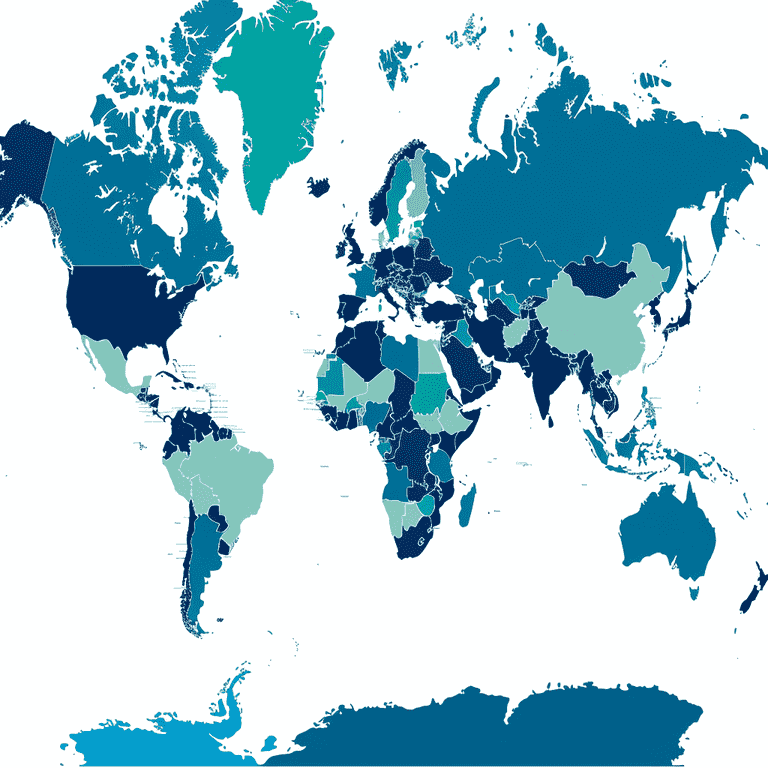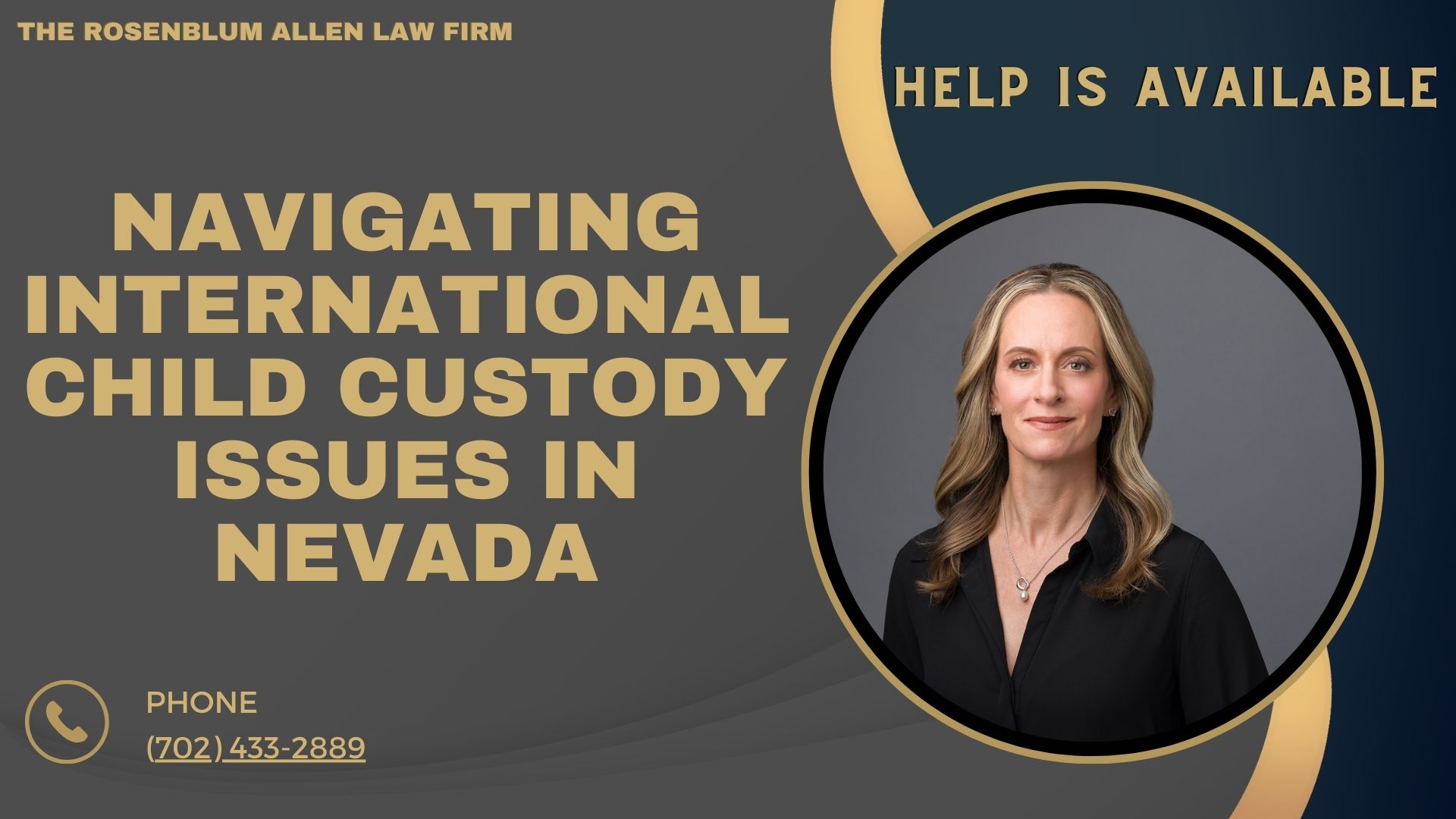International child custody disputes can be incredibly complex, involving multiple legal systems, cultural differences, and emotional challenges. These cases often arise when parents live in different countries or one parent relocates internationally with the child.
Understanding how international custody works is crucial for protecting your parental rights. Whether you’re dealing with a cross-border custody battle or seeking to understand your legal standing, this guide will help you navigate these complicated waters. At The Rosenblum Allen Law Firm, we have the experience to support you through every step of this challenging process.
 Understanding International Custody
Understanding International Custody
International custody involves custody disputes that cross national borders. Unlike domestic custody cases, international custody issues bring additional layers of legal complexity, including international treaties, varying national laws, and the logistics of enforcing custody orders across borders.
Definition of International Custody
International custody refers to disputes where parents reside in different countries or when a parent relocates internationally with their child, creating conflicts over custody and visitation rights.
Differences Between Domestic and International Custody
- Jurisdictional Issues: Domestic custody cases are governed by one state’s laws, while international custody cases must navigate the laws of multiple countries.
- Legal Standards: Countries often have different standards and legal procedures affecting custody decisions.
- Enforcement Challenges: Enforcing custody orders across borders can be difficult, especially if the countries involved do not have agreements like the Hague Convention.
Common Scenarios Leading to International Custody Disputes
- One parent moves to another country with the child, creating a dispute over legal custody.
- Parents of different nationalities separate, leading to disagreements about where the child should live.
- International travel without mutual consent leads to allegations of wrongful retention.

The Hague Convention and Its Role in International Custody Cases
The Hague Convention on the Civil Aspects of International Child Abduction is a critical international treaty that significantly resolves cross-border custody disputes. It aims to protect children from abduction by a parent and to ensure that custody disputes are handled in the appropriate jurisdiction.
What is the Hague Convention?
The Hague Convention is an international treaty designed to protect children from wrongful removal or retention across international borders. It establishes protocols for returning children to their country of habitual residence and ensures custody cases are addressed in the proper jurisdiction.
Purpose and Scope of the Hague Convention
- Prevent Child Abduction: The primary goal is to prevent international child abduction by a parent.
- Jurisdictional Clarity: Determines which country has jurisdiction to decide custody.
- Promote Cooperation: Encourages cooperation between member countries to resolve custody disputes efficiently.
Countries that are Signatories
The Hague Convention has over 100 signatory countries, including the United States, Canada, most European nations, Australia, and Japan. However, not all countries participate, which can complicate custody matters when dealing with non-member nations.
How the Hague Convention Impacts Custody Disputes
Jurisdictional Rules
- Determines which country’s courts have the authority to make custody decisions.
- Typically, the child’s habitual residence is the critical factor in jurisdiction.
Wrongful Removal and Retention of Children
- A child is considered wrongfully removed if taken from their habitual residence without the consent of the other parent or in violation of custody rights.
- Retention becomes wrongful when a parent refuses to return a child to their habitual residence after an agreed-upon period.
Navigating Hague Convention Procedures
Filing a Petition for Return
- A parent can file a petition under the Hague Convention to return the child to their habitual residence.
- Procedures often involve submitting evidence, court hearings, and cross-border legal coordination.
Defenses Against Return Claims
- Certain defenses can be raised, such as proving that returning the child would expose them to harm or that the child objects to returning, depending on their age and maturity.

Legal Challenges in International Custody Disputes
International custody disputes present unique legal challenges. These cases are about more than just who gets custody; they involve navigating complex legal systems, differing laws, and, sometimes, a lack of international cooperation. Understanding these challenges is crucial for parents caught in cross-border custody conflicts.
Jurisdictional Conflicts and Cross-Border Issues
Jurisdiction determines which court has the authority to make custody decisions. This can be one of the most hotly contested issues in international custody cases.
- Determining the Child’s Habitual Residence: This is often the starting point. Courts usually consider where the child has been living recently and where their primary home is.
- Jurisdiction Battles Between Countries: It’s common for parents to file custody petitions in different countries, leading to conflicting court orders. This can result in a lengthy battle over which country’s laws should apply.
Cultural and Legal Differences
Every country has its approach to family law. What’s considered normal in one culture might be unacceptable in another.
- Varying Custody Laws and Practices: Some countries prioritize the mother in custody cases, while others focus on equal parental rights. This can complicate decisions when parents come from different cultural backgrounds.
- Handling Conflicting Legal Systems and Cultural Norms: Differences in legal definitions, such as what constitutes “child abduction,” can make resolving disputes difficult. Cultural norms around parenting and family roles can also significantly affect how cases are viewed and decided.
Enforcement of Custody Orders Internationally
Enforcing a custody order internationally is only sometimes straightforward. Even if a U.S. court grants you custody, it doesn’t automatically mean other countries will honor that order.
- Issues with Enforcing U.S. Custody Orders Abroad: Some countries may need to recognize foreign custody orders, especially if they’re not party to the Hague Convention. Enforcement often depends on treaties or diplomatic efforts.
- Challenges in Non-Hague Convention Countries: In countries that aren’t members of the Hague Convention, recovering a child can only be possible with cooperation from local courts.

Navigating Nevada Custody Laws in International Cases
If you’re dealing with an international custody dispute in Nevada, it’s essential to understand how state laws interact with global principles. Nevada courts handle these cases with a focus on the child’s best interests while balancing the complexities of cross-border legalities.
Application of Nevada Custody Laws in Cross-Border Disputes
Nevada courts handle custody cases that cross international lines in their own way. They consider state laws, federal laws, and international treaties to make decisions.
- How Nevada Courts Approach International Custody Cases: Nevada courts will often examine which jurisdiction is most appropriate, whether the child was wrongfully removed, and how international treaties like the Hague Convention apply.
- Impact of Nevada’s Best Interest Standard on International Custody: Nevada courts prioritize the child’s best interest in all custody decisions. This includes assessing factors like stability, safety, and the child’s connection to Nevada.
Modifying and Enforcing Nevada Custody Orders Internationally
If you have an existing custody order from Nevada, modifying or enforcing it abroad can be challenging.
- Steps to Modify Existing Custody Orders: If circumstances change, such as a parent moving abroad, you may need to modify the custody order. This often involves proving that the change is in the child’s best interest.
- Enforcement of Nevada Orders in Foreign Jurisdictions: Enforcement varies widely depending on the country. You may need to register your Nevada custody order in the foreign jurisdiction or seek a new order there.

Steps to Protect Your Custody Rights in International Disputes
Taking proactive steps can make a significant difference when you’re caught in an international custody dispute. These steps can help you protect your rights and navigate the complexities of cross-border custody battles.
Working with International Family Law Attorneys
An international custody dispute isn’t something you should handle alone. It requires experience in both domestic and international law.
- Importance of Specialized Legal Representation: Attorneys experienced in international family law understand the nuances of cross-border custody. They can guide you through jurisdictional challenges and help you understand your rights under international treaties like the Hague Convention.
- Finding the Right Legal Team for Your Case: Look for attorneys with experience in international custody cases. Check their track record with similar disputes and ask about their understanding of foreign legal systems.
Documentation and Evidence Gathering
Gathering the proper documentation is critical. The more evidence you have, the stronger your case will be in court.
- Collecting Evidence to Support Your Case:
- Keep records of all communications with the other parent, including emails, text messages, and social media interactions.
- Document your involvement in your child’s life, such as school records, medical appointments, and family activities.
- Importance of Documentation in Cross-Border Custody Cases: Courts rely heavily on evidence to make decisions. Proper documentation can prove your involvement in your child’s life, show the child’s habitual residence, and demonstrate any wrongful actions by the other parent.
Planning for International Travel with Children
International travel can complicate custody arrangements, especially if both parents don’t agree on travel plans.
- Legal Precautions Before International Travel:
- Always get written consent from the other parent before traveling internationally with your child.
- Ensure you have the necessary legal documentation, including custody orders and travel consents, to avoid border disputes.
- Understanding Travel Consent Requirements:
- Some countries require additional documentation for children traveling with one parent, such as notarized travel consent forms or court orders.
- It’s also wise to consult an attorney before making travel arrangements to ensure U.S. and foreign law compliance.

Resources for Parents Facing International Custody Issues
Navigating international custody disputes can feel overwhelming, but you’re not alone. Many resources are available to support parents through these challenging times.
Government and Legal Resources
There are several government agencies and legal organizations that can offer assistance in international custody disputes.
- U.S. Department of State’s Office of Children’s Issues:
- This office guides international custody disputes and helps parents navigate the Hague Convention process.
- They can also help locate children who have been wrongfully taken abroad.
- Resources for Navigating International Custody Laws:
- Websites such as Travel.State.Gov provide detailed information on international custody laws and processes.
- The Hague Conference on Private International Law’s website offers resources on applying the Convention in different countries.
Support Organizations and Advocacy Groups
Support groups and advocacy organizations can offer both emotional support and practical advice.
- Organizations Offering Guidance and Support:
- Parents Without Borders: Provides resources and support for parents involved in international custody disputes.
- International Parental Child Abduction Network (IPCAN): Offers information and connects parents with legal professionals.
- Connecting with Other Parents Facing Similar Challenges:
- Online forums and social media groups can provide a sense of community and shared experiences.
- Hearing from others who have been through similar struggles can be comforting and insightful.

Breaking It All Down
Navigating international custody issues is challenging, but understanding your rights and the legal landscape can empower you to take the proper steps. From jurisdictional battles to enforcement struggles, these cases involve complex layers that can overwhelm even the most prepared parents.
We know how personal and stressful these disputes can be at The Rosenblum Allen Law Firm. We are here to guide you through every legal twist and turn, providing the support and experience you need. Whether you’re dealing with cross-border custody battles, enforcement of court orders, or complex legal systems, we’re committed to helping you protect your rights and your child’s best interests.

Frequently Asked Questions
What should I do if my child is taken to another country without my consent?
If your child is taken abroad without your permission, you should contact an attorney immediately and file a petition under the Hague Convention if the country is a member. You can also contact the U.S. Department of State’s Office of Children’s Issues for guidance and assistance locating your child.
Can I travel internationally with my child during a custody dispute?
Traveling internationally during a custody dispute is risky and often requires the other parent’s consent or a court order. Always consult your attorney before making travel plans to ensure you are not violating legal agreements or custody orders.
How can I prove my child's habitual residence in court?
To prove habitual residence, you can present evidence such as school enrollment records, medical appointments, community involvement, and any other documentation showing where your child has been living regularly and participating in daily life.
What if the other parent refuses to return our child after a visit abroad?
If the other parent does not return your child after an international visit, you may need to file a petition under the Hague Convention, assuming the country is a signatory. If you need help, you must work through diplomatic channels or local courts to seek the child’s return.
Are there any defenses against returning a child under the Hague Convention?
Yes, there are several defenses, including proving that returning the child would pose a grave risk of harm, that the child is settled in the new environment, or that the petitioning parent was not exercising custody rights at the time of removal.
What can I do if my custody order isn't being enforced abroad?
Enforcing a custody order abroad can be difficult. You may need to register your custody order with the foreign court system or work with an attorney experienced in international enforcement to take appropriate legal action in the other country.
Do I need a new custody order if I move to another country?
Moving to another country doesn’t automatically require a new custody order, but you may need to modify the existing order to reflect the new circumstances. Always consult with your attorney to understand the legal implications of your move.
How do cultural differences affect international custody decisions?
Cultural differences can significantly impact custody decisions, mainly when foreign courts apply cultural norms and legal standards. This can affect everything from custody preferences to views on parenting roles, making it essential to have legal representation that understands these nuances.

Additional Resources for You from The Rosenblum Allen Law Firm.
To further support you during this challenging time, our lead attorney, Molly Rosenblum Allen, Esq., has created additional resources to help guide you through various aspects of custody law. Here are some helpful articles and guides available on our website:
Las Vegas Custody Attorney: Explore your options and understand the legal landscape with effective guidance on child custody matters in Las Vegas.
Fathers’ Rights: Learn about the rights of fathers in custody battles and how to protect your parental rights.
Supervised Visitation: Understand supervised visitation, including when it’s required and how it works to ensure safe and healthy child-parent interactions.
Changing Custody Agreement: Find out how to modify existing custody agreements when circumstances change, ensuring the best interest of your child.
Grandparents’ Rights Nevada: Discover the rights grandparents have in Nevada when it comes to custody and visitation.
Long Distance Co-Parenting: Get tips on managing co-parenting responsibilities across state lines or international borders.
How a Mother Can Lose a Custody Battle: Learn about common pitfalls mothers face in custody battles and how to avoid them.
Custody Battle Tips for Nevadans: Practical tips for navigating custody disputes, tailored specifically for Nevada residents.
What Not To Say In Child Custody Mediation: Essential advice on how to approach mediation discussions and what to avoid saying.
How Much is a Custody Lawyer: A guide to understanding the costs associated with hiring a custody lawyer.
Types of Custody in Las Vegas: Detailed explanations of different custody arrangements available in Las Vegas.
Nevada Child Custody Laws: An overview of the child custody laws specific to Nevada to help you understand your rights and obligations.
These resources are designed to provide you with the information and support you need during this challenging time. If you have further questions or need personalized assistance, please don’t hesitate to reach out to The Rosenblum Allen Law Firm for effective legal guidance.

Offsite Resources for You
U.S. Department of State – Office of Children’s Issues: Provides guidance on international parental child abduction, the Hague Convention, and other cross-border custody issues. This resource is particularly useful for understanding the legal processes involved in international custody disputes.
American Bar Association (ABA) Family Law Section: Offers articles, publications, and resources on family law, including international custody issues. It’s a great starting point for understanding the broader legal landscape.
National Center for Missing & Exploited Children (NCMEC): Provides assistance in cases of international child abduction and offers resources to help parents locate their children and navigate the legal process.
Hague Conference on Private International Law: Offers information on the Hague Convention and other international treaties related to family law. This resource helps parents understand international legal frameworks that impact custody disputes.
Parents Without Borders: Supports parents facing international custody disputes, offering legal resources, advocacy, and connections to other parents in similar situations.
International Social Service (ISS) USA: Provides cross-border case management services and legal support for families facing international custody and child welfare issues.
Association of Family and Conciliation Courts (AFCC): An interdisciplinary organization that offers resources on family law and dispute resolution, including mediation and custody evaluation services.

A Special Message from Our Lead Attorney, Molly Rosenblum Allen, Esq

Thank you for taking the time to read through our resources. I hope you found the information helpful as you navigate your family law challenges. We know that international custody issues can be overwhelming, and my team and I are here to support you every step of the way. If you’re ready to take the next step, call us at (702) 433-2889. We look forward to helping you get started on finding the right path for your situation.
Best regards,
Molly Rosenblum Allen, Esq.






